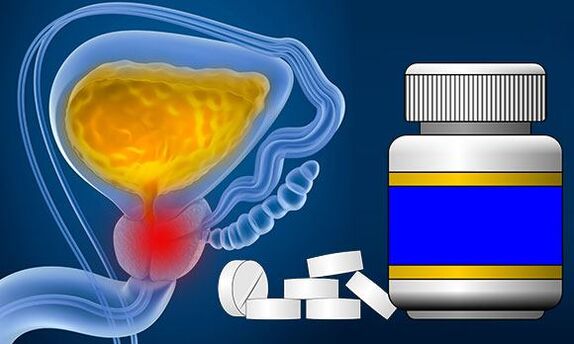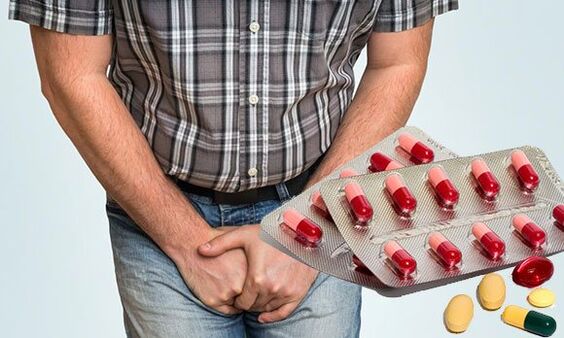
Given the growing number of prostatitis patients, the pharmaceutical industry offers hundreds of different treatments for the disease, and the drug arsenal is constantly being replenished. Faced with this problem, most men don't go to the doctor, but to the pharmacy, hoping to get a "magic bullet" within a few days to rid them of this scourge. Without understanding the problem, a person does not know which prostatitis medicine to choose is cheap and effective. Nor can a pharmacist answer that question for him, supplying the most popular drugs that may be completely useless or even harmful.
The specialist should choose an effective treatment regimen, taking into account the form and stage of development of the disease, the individual characteristics of the patient and the presence of contraindications. The drugs used are divided into the following groups:
- Etiotropic - Antibacterial agent designed to destroy infectious pathogens.
- Symptomatic - relieve pain symptoms.
- Pathogenic - Helps to remove congestion in the pelvic area and improve blood supply to the prostate.
Complex drug treatment includes the use of such drugs:
- antibiotic.
- Anti-inflammatory (medicine.
- Alpha-blockers.
- Antispasmodic.
- Means of improving blood circulation.
Pills for prostatitis in men are considered in detail.
Antibacterial agents
They represent the shock group in drug-therapeutic combinations, which are used in acute and chronic diseases. Their task is to destroy pathogenic microorganisms, relieve symptoms of poisoning and reduce inflammation. Since each infectious agent is susceptible to certain antibiotics, bakposev is performed to select the correct drug.
Medications for prostatitis in men are tablets, injections, rectal suppositories, and infusion solutions (injecting the drug into the urethra). Urologists believe that for prostate inflammation, the most significant therapeutic effect is observed with rectal administration.
The antibiotics used are divided into the following groups:
- Fluoroquinolones - have the most significant therapeutic effect.
- Cephalosporins are effective against many pathogens but have a short duration of action.
- Aminopenicillin - for mild inflammation, uncomplicated, rare exacerbations of the chronic form.
- Tetracycline - Rarely causes side effects. They show more pronounced activity against atypical pathogens (mycoplasma, chlamydia) than other antibiotics.
- Macrolides - less effective, but at the same time low toxicity.
Complex treatment options include antimicrobials:
| drug group | Clinical application characteristics |
|---|---|
| protected aminopenicillin | They are used in the acute course and infrequent exacerbation of chronic prostatitis caused only by the typical microbiota. Inactive against atypical pathogens. |
| Fluoroquinolones | The antibacterial effects exhibited against most typical and atypical microorganisms are different. Perfect penetration and concentration in the prostate tissue. They have a long duration of action, so they are prescribed once a day. |
| cephalosporins | They have broad-spectrum and short-term antibacterial effects. They can make up an alarming group of antibiotics when it comes to treating any form of prostatitis. |
| Macrolides | Antibacterial agent with long-term daily action and cumulative capacity. They penetrate well into prostate tissue. They show the greatest activity against atypical pathogens. All of these allow the use of this group of antibiotics to treat any type of prostatitis. |
| other antibacterial agents | They constitute an additional group of drugs that are used as a complement to the main drug in complex treatment regimens. |
Anti-inflammatory drugs

Anti-inflammatory drugs for prostatitis are used in combination with antibiotics. NSAIDs help reduce swelling of the glands, which can reduce pressure on the urethra and difficulty urinating. In addition, these drugs have analgesic properties. If there is no positive effect of this group of drugs, the patient is prescribed potent hormonal anti-inflammatory drugs.
other methods

One of the most unpleasant symptoms of prostatitis is urination problems caused by smooth muscle spasms of the glands and urea. To eliminate this violation, a group of alpha-blockers was used. Their action is designed to relax muscle fibers and facilitate the release of urine.
To reduce inflammation and reduce pain, antispasmodics are prescribed.
It is impossible today to say the best drug for prostatitis because each patient responds differently to drug therapy. What works in one situation may be completely useless in another.
Inflammation of the prostate is caused not only by exposure to causative pathogens, but also by congestion. Such diseases also prevent rapid tissue regeneration, recovery of affected organ function, and reduce the effectiveness of drug treatments. To get rid of them, drugs are used to improve the blood supply to the glands.
Precaution
To maintain a healthy prostate, you need:
- Proper Nutrition - The diet should include foods that provide the body with the necessary macro and micro elements, vitamins.
- Regular intimacy.
- Prompt diagnosis and treatment of urogenital diseases.
- enough physical activity.






















